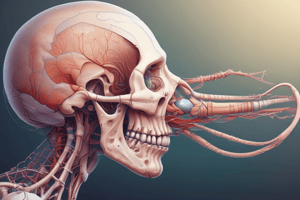Podcast
Questions and Answers
What is the primary function of the epididymis in the male reproductive system?
What is the primary function of the epididymis in the male reproductive system?
- Production of sperm
- Secretion of reproductive hormones
- Storage and transportation of sperm (correct)
- Regulation of testosterone production
During which week of embryonic development do the three primary germ layers form?
During which week of embryonic development do the three primary germ layers form?
- Week 9-12
- Week 3-8 (correct)
- Week 13-16
- Week 1-2
What is the term for the process by which sperm become capable of fertilization?
What is the term for the process by which sperm become capable of fertilization?
- Fusion of gametes
- Zygote formation
- Sperm capacitation (correct)
- Gastrulation
Which hormone is primarily involved in regulating the female reproductive cycle?
Which hormone is primarily involved in regulating the female reproductive cycle?
What is the site of fertilization in the female reproductive system?
What is the site of fertilization in the female reproductive system?
Flashcards are hidden until you start studying
Study Notes
Embryonic Development
- Week 1-2: Zygote formation, cleavage, and blastulation
- Zygote: fertilized egg that undergoes several cell divisions
- Cleavage: rapid cell division without significant growth
- Blastulation: formation of blastocyst with inner cell mass and outer trophectoderm
- Week 3-8: Gastrulation and organogenesis
- Gastrulation: formation of three primary germ layers (ectoderm, endoderm, mesoderm)
- Organogenesis: development of major organs and body systems
- Fetal development: Week 9-38
- Growth and maturation of organs and body systems
- Development of sensory organs, nervous system, and musculoskeletal system
Fertilization
- Sperm capacitation: process by which sperm become capable of fertilization
- Occurs in the female reproductive tract
- Involves changes in sperm morphology and physiology
- Fusion of gametes: sperm penetration of the egg
- Involves binding of sperm to the zona pellucida and fusion with the egg membrane
- Zygote formation: fusion of male and female pronuclei
- Results in the formation of a single, diploid cell
Hormonal Regulation
- Hypothalamic-pituitary-gonadal (HPG) axis:
- Regulates reproductive hormone production and release
- Involves the hypothalamus, pituitary gland, and gonads (ovaries and testes)
- Reproductive hormones:
- Estrogen and progesterone in females
- Testosterone in males
- Regulate various aspects of reproduction, including gametogenesis, ovulation, and menstrual cycle
Male Reproductive System
- Testes:
- Produce sperm through spermatogenesis
- Regulated by testosterone and other hormones
- Epididymis:
- Stores and transports sperm
- Sperm maturation and capacitation occur here
- Vas deferens:
- Muscular tube that transports sperm during ejaculation
- Penis:
- External genital organ
- Delivers sperm during ejaculation
Female Reproductive System
- Ovaries:
- Produce eggs through oogenesis
- Regulated by estrogen and progesterone
- Fallopian tubes:
- Site of fertilization
- Transport eggs from ovaries to uterus
- Uterus:
- Site of embryonic development
- Prepares for implantation and supports fetal growth
- Vagina:
- External genital organ
- Receives sperm during intercourse and serves as birth canal
Embryonic Development
- During weeks 1-2, a zygote forms through fertilization, undergoes cleavage (rapid cell division without significant growth), and blastulation (formation of blastocyst with inner cell mass and outer trophectoderm)
- In weeks 3-8, gastrulation occurs, forming three primary germ layers (ectoderm, endoderm, mesoderm), followed by organogenesis, where major organs and body systems develop
- From weeks 9-38, the fetus grows and matures, with development of sensory organs, nervous system, and musculoskeletal system
Fertilization
- Sperm capacitation is the process by which sperm become capable of fertilization, involving changes in sperm morphology and physiology, and occurs in the female reproductive tract
- Fusion of gametes occurs when a sperm penetrates the egg, involving binding of sperm to the zona pellucida and fusion with the egg membrane
- Zygote formation results from the fusion of male and female pronuclei, forming a single, diploid cell
Hormonal Regulation
- The hypothalamic-pituitary-gonadal (HPG) axis regulates reproductive hormone production and release, involving the hypothalamus, pituitary gland, and gonads (ovaries and testes)
- Reproductive hormones, such as estrogen and progesterone in females, and testosterone in males, regulate various aspects of reproduction, including gametogenesis, ovulation, and menstrual cycle
Male Reproductive System
- Testes produce sperm through spermatogenesis, regulated by testosterone and other hormones
- The epididymis stores and transports sperm, where sperm maturation and capacitation occur
- The vas deferens is a muscular tube that transports sperm during ejaculation
- The penis is the external genital organ that delivers sperm during ejaculation
Female Reproductive System
- Ovaries produce eggs through oogenesis, regulated by estrogen and progesterone
- Fallopian tubes are the site of fertilization, transporting eggs from ovaries to uterus
- The uterus is the site of embryonic development, preparing for implantation and supporting fetal growth
- The vagina is the external genital organ that receives sperm during intercourse and serves as the birth canal
Studying That Suits You
Use AI to generate personalized quizzes and flashcards to suit your learning preferences.




